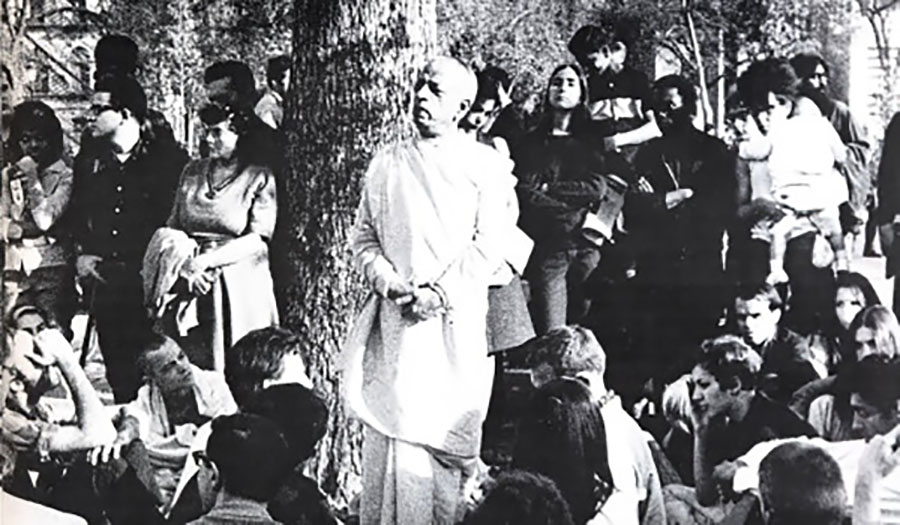ISKCON 50 Meditations: August 11, 2016
By Satsvarupa dasa Goswami | Авг 11, 2016

Responding to the Swami’s Call
Swamiji said, “This boy Steve is nice, he gives donations and does typing.” After he said that, I went downstairs into the storefront. I picked up the double bass which I had donated to the temple. No one was around, so I started strumming, feeling happy and savoring the glow of what Swamiji had said. In those days, we didn’t know the proper expression for gratitude: making prostrated obeisances and saying a mantra to the guru. However, as I strummed, I chanted Hare Krishna.
One night after kirtana, I stopped on the way home at a quick-serve pizzeria for a slice of pizza and a Coke. I did not know you were supposed to offer the food to Krishna, and that this food was unofferable. Having a pizza was a celebration of my new-found ecstasy.
On the walls of my apartment, I painted abstractions of madness and loneliness, but after I started seeing the Swami, a different mood broke out. A positive figure appeared on the wall. I chanted and painted for over two hours.
Swamiji gave us wholesome life. At first it was hard to accept. I thought, “It is cool, the life I have. It is desperate, but after all, life itself is desperate – just like Van Gogh said, misery is eternal. You can get high on pot and you can try your best. You are an artist. Keep trying.” I fed myself existential philosophy: “Although life is absurd, you must give it meaning.” Swamiji replaced the dismal view.
Prabhupada said, “Krishna consciousness is not an artificial imposition on the mind. It is the original energy of the living being.” He uncovered instincts that were buried in my psyche, belief in God, desire for good food and work, all the things I thought I had to give up because they were square. He exposed the fact that I was living a lie. He proved that happiness is now.
Responding to Swamiji’s love was one of the first things I did on my own. Everything before that was conditioned by my parents, and after that it was conditioned by a reaction against them. Not many people on the Lower East Side were going to him. It was not something my parents wanted from me, and neither was it what my hip friends wanted me to do, nor what my worshipable authors wanted me to do. The religion I was raised in did not teach me how to love. No one encouraged me, yet everything was encouraging me from within. My sense of survival and sanity and religiosity – everything was saying, “Don’t listen to other voices. Do it!”
Years later, Prabhupada was reminiscing. He said to Kirtananda Swami, “You came with the others?”
“Yes,” Kirtananda said. “Me and Umapati and Hayagriva all lived together.” Then Prabhupada turned to me and said, “You came with them also?” I said, “No, Prabhupada, I came by myself.”
“Oh yes,” he said.















